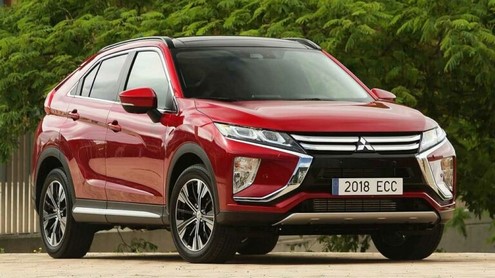The Mitsubishi Eclipse Cross (GK) has been in production since 2017, with a facelift following in 2021. In Germany, the compact SUV can only be configured as a plug-in hybrid.
The known problems with the Mitsubishi Eclipse Cross include:
- starting issues with the 1.5 T-MIVEC engine when combined with a manual transmission
- wind noise that can be quite present even at lower speeds and become uncomfortably loud at around 130 km/h
- recalls due to issues with wheel arch trims that have partially detached from the vehicle, a software fault in the “Active Stability Control” (ASC) system that can affect other driver assistance systems, and a potential issue with the “Forward Collision Mitigation” (FCM) system that may cause sudden braking.
Strong petrol and diesel engines
The petrol engine is a 1.5-liter four-cylinder with turbocharging that produces 163 horsepower. What sets the 4B40 engine apart from the mass of downsizing engines is the way it mixes fuel: while the competition mostly relies on pure gasoline direct injection, Mitsubishi uses a combination of direct and intake port injection to prevent or significantly reduce long-term problems caused by carbon deposits.
A diesel was also available: the 2.2-liter with common-rail injection (4N14 series) is fundamentally solid, even though it has caused trouble in the past due to defective balance shafts – fortunately not in the Eclipse Cross, but in the Mitsubishi Outlander.
Regarding fuel consumption, according to spritmonitor.de, it is around eight liters, similar to the petrol engine, which is due in no small part to the all-wheel drive.
Poor acceleration and software problems
Some owners complain of acceleration problems with the 1.5 T-MIVEC when paired with the manual transmission, which is related to poor clutch control. Another shortcoming is wind noise, which is quite present even at highway speeds and becomes unpleasantly loud at around 130 km/h.
In addition, the Mitsubishi Eclipse Cross is affected by several recalls: around 30,000 models produced between October 2, 2017 and June 1, 2020 had to be recalled due to wheel arch covers that had partially detached from the vehicle. Another recall affects models built between 2016 and 2018: here, a software error in the “Active Stability Control” (ASC) can affect other assistance systems.
The “Forward Collision Mitigation” (FCM) collision warning system can also initiate a sudden braking action due to misinterpretations. The recall initiated for this purpose (code: “R30409”) affects different model years between 2017 and 2021.

